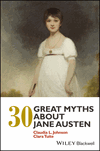JANE AUSTEN WRITES ESCAPE FICTION
Summary
J.R.R. Tolkien's remark seems so obviously true that it shouldn't feel discomfiting to discuss reading Jane Austen for Escape, but the subject is so wrapped up in loaded judgments, assumptions, and confusions about classes of literature, kinds of reading, and escape itself that conversations about it can feel booby-trapped. Reading “for escape” can sometimes refer to specific kinds of literature – “genre” fiction and popular fiction, such as harlequin romances, spy novels, or mysteries – that are readily consumable, readily forgettable and readily wish-fulfilling. Austen's perceived readiness to represent the satisfactions of prosaic life appeared attractive when contrasted to contemporary sensational fiction, which was often judged to emerge out of sensibilities so jaded and degraded that only the lurid or extreme subjects could be considered engaging. But Austen was a locus of escape not merely because of what was not in her fiction.



